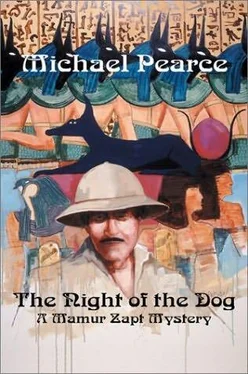Michael Pearce - The Mamur Zapt and the Night of the Dog
Здесь есть возможность читать онлайн «Michael Pearce - The Mamur Zapt and the Night of the Dog» — ознакомительный отрывок электронной книги совершенно бесплатно, а после прочтения отрывка купить полную версию. В некоторых случаях можно слушать аудио, скачать через торрент в формате fb2 и присутствует краткое содержание. Жанр: Исторический детектив, на английском языке. Описание произведения, (предисловие) а так же отзывы посетителей доступны на портале библиотеки ЛибКат.
- Название:The Mamur Zapt and the Night of the Dog
- Автор:
- Жанр:
- Год:неизвестен
- ISBN:нет данных
- Рейтинг книги:3 / 5. Голосов: 1
-
Избранное:Добавить в избранное
- Отзывы:
-
Ваша оценка:
- 60
- 1
- 2
- 3
- 4
- 5
The Mamur Zapt and the Night of the Dog: краткое содержание, описание и аннотация
Предлагаем к чтению аннотацию, описание, краткое содержание или предисловие (зависит от того, что написал сам автор книги «The Mamur Zapt and the Night of the Dog»). Если вы не нашли необходимую информацию о книге — напишите в комментариях, мы постараемся отыскать её.
The Mamur Zapt and the Night of the Dog — читать онлайн ознакомительный отрывок
Ниже представлен текст книги, разбитый по страницам. Система сохранения места последней прочитанной страницы, позволяет с удобством читать онлайн бесплатно книгу «The Mamur Zapt and the Night of the Dog», без необходимости каждый раз заново искать на чём Вы остановились. Поставьте закладку, и сможете в любой момент перейти на страницу, на которой закончили чтение.
Интервал:
Закладка:
“It will be very boring,” Owen complained.
“I certainly hope so.”
“Mightn’t she find it boring too?”
“Oh, I don’t know. There are the horses. Don’t girls like horses?”
“I would have thought she’d have outgrown that.”
“I would have thought so too, but last night I spent a whole dinner sitting between two girls who talked about nothing but horses. That’s what gave me the idea.”
“I think she may be different.”
“So she may, and tomorrow’s the chance for her to find that out. I’ve arranged for you to pick her up from her hotel at four o’clock.”
The polo took place at the Khedivial Sports Club, or Gezira, as it was familiarly known, and the following afternoon found Owen walking dutifully about its spacious grounds with Jane Postlethwaite’s hand resting lightly on his arm. He had been somewhat apprehensive about the encounter in view of the way their last meeting had ended, but fortunately she seemed to have put her irritation behind her. They stood beneath the trees for a while watching the game.
“Do you play polo yourself, Captain Owen?” she asked politely.
“A lot of people did in India,” he said. Honesty compelled him to add: “I didn’t. I couldn’t afford the ponies.”
Jane Postlethwaite turned her candid gaze upon him.
“They are very expensive, I presume?”
“Not in themselves. It’s the things that go with them. Stabling, a syce-that’s a sort of groom-that kind of thing. You couldn’t really manage it on a subaltern’s pay. Of course, most of the officers had private incomes.”
The play moved over to the other side of the field and they stopped their conversation for a moment to follow it. Then a long hit sent ponies and riders thundering away.
“It seems wrong,” said Jane Postlethwaite.
“What does?”
“To spend your money on this sort of thing.”
“There are worse things to spend your money on.”
“And better.” She turned away. “Shall we walk through the grounds?”
The grounds were beautiful and well kept. There were marvellous flowerbeds, rose-gardens and herbaceous borders, well-established trees and shrubberies in full bloom. Yet the pride of the Gezira was its turf. Lush, green fields stretched in all directions. They were heavily watered each day in both the morning and the evening and kept their greenness in spite of the wear and the sun. All the pitches were lined with trees under which spectators could sit and which made splendid spots for picnics when no game was going on. There were several families under the trees now, with little children running around and babies crawling about in the grass. Jane Postlethwaite watched them with pleasure.
“I can see now,” she said. “I can see how it might be possible to bring up a family here. I wondered how an English family could manage it. It’s so hot. It would drain the energy out of you.”
“You get used to it.”
“Especially with children.”
“Lots of men send their families home to England in the summer.”
“I wouldn’t like that,” said Jane Postlethwaite with a decided shake of her head. “I wouldn’t like that at all.”
They made a wide circle through the grounds. By the time they came back to the club house the sun was already setting. Through the trees they could see the spectators returning from the polo. Because of the heat games never started before four and they had to finish soon after six because of the early Egyptian twilight. There was time for one innings only if you were playing cricket. All matches had to be two-day ones.
They approached the club house through a fine avenue of tall mimosas. Jane Postlethwaite dawdled.
“It’s lovely,” she said enthusiastically. “It’s just like one of those avenues you sometimes see in Italy. Different trees, of course. But against the sky, especially when it’s beginning to get dark… Have you ever visited Italy, Captain Owen?”
Owen hadn’t. To him Italy was as alien and remote as- well, as England was. It was ten years since he had been in Europe. He had left England when he was nineteen. The landscape he knew was that of the East.
Jane Postlethwaite went happily up the steps of the club house and off to the ladies’ room. Owen waited outside. At this time of day it was cooler outside than in the airless rooms of the club. He took a turn along a path between the great bougainvillaea bushes. A man came along the path towards him, obviously taking the air, as he was. He looked at Owen, stopped and stretched out his hand. t
“Hello,” he said. “Enjoying the polo?”
“The grounds more,” said Owen.
It was Ramses, the civil servant from the Ministry of Finance whom he had talked to at the Consul-General’s reception.
“Me too,” said Ramses. “I bring my family out here for a picnic. The boys like watching but I can’t say I greatly enjoy it myself.”
They fell into step beside each other. Owen asked how John Postlethwaite was getting on in the ministry.
“All right. He’s very thorough. He knows his stuff.”
“I wish I did. Accounting has always been a closed book to me.”
“I don’t suppose it figures large in an officer’s training.”
“No. But when you move into administration you find you need it.”
“All administration is ultimately money,” said Ramses, who had a professional bias in the matter.
“Money. And people.”
“The two go together.”
“Especially in Cairo.”
They both laughed.
“I’m having problems,” said Owen.
“A soldier’s pay doesn’t go far,” said Ramses neutrally.
“No, no. It’s not that. I’m having problems with my viring.”
“You don’t have powers of virement, surely?”
“I’ve sort of had in the past.”
Ramses grinned.
“But they’ve found out?”
“Yes, but I need to vire, if that’s what you call it. I get my money through all sorts of old accounts. It might have been all right in the past but it doesn’t work now.”
“That’s the problem with Egypt’s finances as a whole,” said Ramses. “And that, actually, is why Lord Cromer suspended all delegated powers of virement. Everyone was switching money from one account to another and usually into their own account as well.”
“I’m not doing that. I’m just trying to make things work.”
“You won’t get them to agree to virement. What you’ll have to do is to ask for your allocation to be increased.”
“Garvin said I wouldn’t get anywhere doing that. It’s mixed up with the levy on Copts, apparently.”
“The proposed levy. It’s not been agreed yet. Yes, that’s quite true. There’s an across-the-board freeze on any increases in allocation until the levy business is settled. But there usually is at this time of year anyway. It’s getting near the end of the financial year. You won’t get any increase this year, but if you put in a good bid now you might get your allocation upped for next year.”
“Well, thanks,” said Owen. “It’s now that I need it.”
“That’s what they all say. Including the Khedive.”
They headed back towards the club house.
“It’s not just the levy,” said Ramses. “It’s the general political situation. The levy’s only a pretext.”
“I thought the Copts didn’t like it?”
“They don’t. But that’s not the only reason for introducing it.”
“The Khedive needs money.”
“He always does. No, it’s not that either, though that also is true. No, the real point is to make it impossible for Patros Bey.”
“Make what impossible?”
Ramses looked sideways at him.
“You haven’t heard?” He hesitated. “I thought you would have. Otherwise I wouldn’t have spoken. Oh well, you’ll soon know, or else you’ll find out: the Consul-General is trying to get the Khedive to make Patros Prime Minister.”
Читать дальшеИнтервал:
Закладка:
Похожие книги на «The Mamur Zapt and the Night of the Dog»
Представляем Вашему вниманию похожие книги на «The Mamur Zapt and the Night of the Dog» списком для выбора. Мы отобрали схожую по названию и смыслу литературу в надежде предоставить читателям больше вариантов отыскать новые, интересные, ещё непрочитанные произведения.
Обсуждение, отзывы о книге «The Mamur Zapt and the Night of the Dog» и просто собственные мнения читателей. Оставьте ваши комментарии, напишите, что Вы думаете о произведении, его смысле или главных героях. Укажите что конкретно понравилось, а что нет, и почему Вы так считаете.












